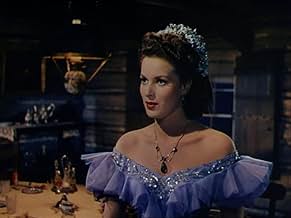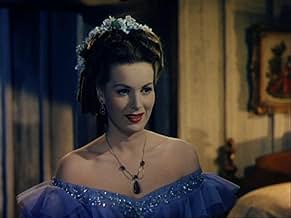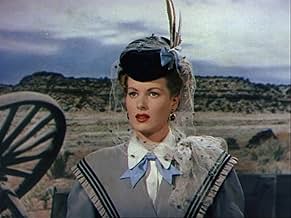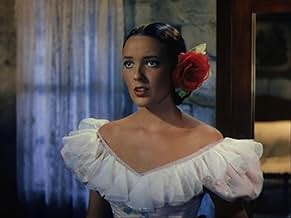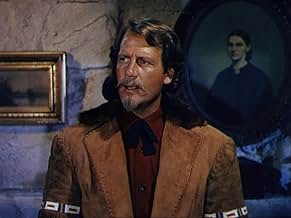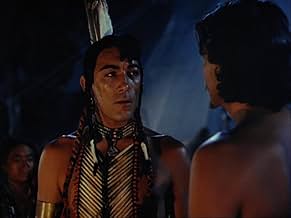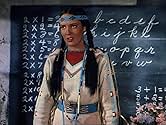AVALIAÇÃO DA IMDb
6,4/10
1,8 mil
SUA AVALIAÇÃO
Adicionar um enredo no seu idiomaThe story of William "Buffalo Bill" Cody, legendary westerner, from his days as an army scout to his later activities as owner of a Wild West show.The story of William "Buffalo Bill" Cody, legendary westerner, from his days as an army scout to his later activities as owner of a Wild West show.The story of William "Buffalo Bill" Cody, legendary westerner, from his days as an army scout to his later activities as owner of a Wild West show.
- Direção
- Roteiristas
- Artistas
- Prêmios
- 2 vitórias no total
Carl Andre
- Trooper
- (não creditado)
Arthur Aylesworth
- Pool Player Debunking Cody
- (não creditado)
Evelyn Beresford
- Queen Victoria
- (não creditado)
Edward Biby
- Sergeant
- (não creditado)
Sidney Blackmer
- Theodore Roosevelt
- (não creditado)
Billy Bletcher
- Short Man
- (não creditado)
William A. Boardway
- Washington DC Cafe Customer
- (não creditado)
Avaliações em destaque
"Buffalo Bill" is a highly romanticized picture of 'Buffalo' Bill Cody. While IMDb is correct that most of the things in this biopic are actually based on Cody's real-life exploits, most of the relationship between him and his wife was pure hooey. Sadly, there was no great love in Cody's life--or if there was, it wasn't his wife! Most of their life was spent apart by his choice--and there were other women in his life. But, this image of Bill would not have gotten past censors back in 1944, so the studio fictionalized this aspect of his life. The rest, however, is reasonably accurate--something that surprised me as I watched the film. He was a scout for the US Army in the west, he fought in the Indian wars and he did start up an incredibly successful Wild West Show.
Another aspect of the film that struck me was its treatment of the American Indians--particularly the Cheyenne. It was odd, as the major roles of the 'Indians' were played by Linda Darnell and Anthony Quinn!!! This insensitivity was pretty much the way American Indians were portrayed in American films through the 1950s. HOWEVER, despite this insensitivity, the film did correctly assert that the Indian wars were forced on these people due to how they were treated by the government. And, in this way, the film was much more balanced than many westerns of the day.
Overall, a somewhat inaccurate film that looked nice and featured the excellent acting, as usual, by Joel McCrea. Worth seeing--just not exactly the Gospel! And, the final line of the film might make you throw up--so when that little kid in the audience stands up, PLUG YOUR EARS!!!
By the way, the film made one HUGE mistake. General Sherman NEVER said "The only good Indian is a dead Indian". This quote was actually from General Sheridan--though it's not exactly what he said. When he was asked what a good Indian was like, he said very succinctly "...a dead one".
Another aspect of the film that struck me was its treatment of the American Indians--particularly the Cheyenne. It was odd, as the major roles of the 'Indians' were played by Linda Darnell and Anthony Quinn!!! This insensitivity was pretty much the way American Indians were portrayed in American films through the 1950s. HOWEVER, despite this insensitivity, the film did correctly assert that the Indian wars were forced on these people due to how they were treated by the government. And, in this way, the film was much more balanced than many westerns of the day.
Overall, a somewhat inaccurate film that looked nice and featured the excellent acting, as usual, by Joel McCrea. Worth seeing--just not exactly the Gospel! And, the final line of the film might make you throw up--so when that little kid in the audience stands up, PLUG YOUR EARS!!!
By the way, the film made one HUGE mistake. General Sherman NEVER said "The only good Indian is a dead Indian". This quote was actually from General Sheridan--though it's not exactly what he said. When he was asked what a good Indian was like, he said very succinctly "...a dead one".
I enjoyed watching the film "Buffalo Bill." Unfortunately close blood relations of Buffalo Bill were still living at that time, and they should have made an effort not to make errors.
Louisa Frederici met Cody in Saint Louis, and served out the end of the war there planning on making her his bride. They were married in her father's home (John Frederici) on South 8th Street in Saint Louis. They left right away for a steamboat to Kansas. Her father did not go along, and was NOT a Senator.
It is a fine film, and entertaining. When Bill Cody returned to the West in 1866 he was married! There was no Linda Darnell's character. Just once I would like for Hollywood to do an exact biography without changing the facts!
I am a Frederici descendant. Terry Alan Klasek Saint Louis, Missouri
Louisa Frederici met Cody in Saint Louis, and served out the end of the war there planning on making her his bride. They were married in her father's home (John Frederici) on South 8th Street in Saint Louis. They left right away for a steamboat to Kansas. Her father did not go along, and was NOT a Senator.
It is a fine film, and entertaining. When Bill Cody returned to the West in 1866 he was married! There was no Linda Darnell's character. Just once I would like for Hollywood to do an exact biography without changing the facts!
I am a Frederici descendant. Terry Alan Klasek Saint Louis, Missouri
This is an entertaining chronicle of the noted frontier explorer . A simple story of William "Buffalo Bill" F. Cody (Joel McCrea) , legendary westerner , whose adventures made him a hero , this is a fictionalized account of the life and career from his days as an army scout or frontier hunter , his marriage to Louisa Frederici Cody (Maureen O'Hara) , to his later activities as showmanship . There happen sad events , as a lot of Buffalos had been exterminated , as hordes of eager hunters pursued the Buffalo herds in mass attacks and newspapers publicized special excursions to Buffalo grounds , including ¨the Great Russian Duke hunt¨ . Bill participated but also denounced these deeds . His hat along with a small part of his scalp was shot off by the Sioux Indians with their chief Crazy Horse and Cheyennes tribes , as in 1869 took place the action leading to a stunning victory over the Cheyenne at Summit Springs , Kansas . And there occurred his fight against ¨Yellow Hand¨ (Anthony Quinn) . Bill inspired dime novelist Ned Buntline (Thomas Mitchell) to write a serial featuring him and he began escorting hunting parties for rich men . The movie describes his rising and fall when Bill assaults an editor , denounced fraud , evicted from Astor ; though Bill , finally , accused Monied interests of instigating Indian wars . After winning a Congressional medal of Honor for bravery , then Cody left scouting and headed East to begin a theatrical career . Bill , subsequently , becomes a wealthy owner of a Wild West show , as a showman made him a legend.
Good biographic movie portraying the famous Wild West role . Well and lavishly directed by William A. Wellman with a great all-star-cast as Joel McCrea , Maureen O'Hara , Anthony Quinn , Linda Darnell , Edgar Buchanan , among others . Being emotionally right on the mark and there's precious action . The picture has an excellent Mise-En-scene with spectacular battles , big production design , thrilling score by David Buttolph and spectacular cinematography by Leon Shamroy .
During his 72 years Bill (1846-1917) enjoyed one of the greatest careers in Western history . Bill started early , by the age of 14 , he had already worked as drover , prospector , trapper and Pony Express rider . While grading track , and hunting Buffalos for the Kansas Pacific Railroad , after the Civil War , 21-year-old William F. Cody allegedly received the nickname ¨Buffalo Bill¨ after bringing down 11 of the beasts with 12 shots . Like his friend , ¨Will Bill Hickock¨ whom he met during the Civil war , Cody scouted for the Union in its wartime campaign against the Plains tribes and continued operating against Indians in the service of General Sheridan , General Carr's 5th Cavalry and other commanders . The dime novels and other popular entertainments of the time had already begun to be filled with rather fanciful accounts of Cody's exploits . And coming west on the newly completed transcontinental railroad . Shortly thereafter, the celebrated scout moved to Fort McPherson , Nebraska . In 1875-1876 he returned briefly to scouting in the Sioux Wars where he distinguished himself yet again . From then until his death in 1917 , Bill divided his time between ranching and producing Wild West Shows , in which Bill was cheered by crowds of enthusiastic citizens that made him wealthy and secured his everlasting fame .
Other films about ¨Buffalo Bill¨ are the followings : ¨Battling with Buffalo Bill¨ (1931) by Ray Taylor with Tom Tyler , ¨The Plainsman¨ (1936) by Cecil B. De Mille with Gary Cooper , James Ellison , Jean Arthur , ¨Buffalo Bill in Tomahawk Territory¨ by Bernard Ray with Clayton Moore , Chief Thundercloud , ¨Buffalo Bill rides again ¨ (1947) by Bernard Ray with Richard Arlen , ¨Buffalo Bill¨ by Mario Costa with Gordon Scott , Mario Petri and the historical pastiche as well as perennial underrated ¨Buffalo Bill and the Indians¨ (76) by Robert Altman with Paul Newman who appears as a charlatan and shameless exemplar of encroaching imperialism .
Good biographic movie portraying the famous Wild West role . Well and lavishly directed by William A. Wellman with a great all-star-cast as Joel McCrea , Maureen O'Hara , Anthony Quinn , Linda Darnell , Edgar Buchanan , among others . Being emotionally right on the mark and there's precious action . The picture has an excellent Mise-En-scene with spectacular battles , big production design , thrilling score by David Buttolph and spectacular cinematography by Leon Shamroy .
During his 72 years Bill (1846-1917) enjoyed one of the greatest careers in Western history . Bill started early , by the age of 14 , he had already worked as drover , prospector , trapper and Pony Express rider . While grading track , and hunting Buffalos for the Kansas Pacific Railroad , after the Civil War , 21-year-old William F. Cody allegedly received the nickname ¨Buffalo Bill¨ after bringing down 11 of the beasts with 12 shots . Like his friend , ¨Will Bill Hickock¨ whom he met during the Civil war , Cody scouted for the Union in its wartime campaign against the Plains tribes and continued operating against Indians in the service of General Sheridan , General Carr's 5th Cavalry and other commanders . The dime novels and other popular entertainments of the time had already begun to be filled with rather fanciful accounts of Cody's exploits . And coming west on the newly completed transcontinental railroad . Shortly thereafter, the celebrated scout moved to Fort McPherson , Nebraska . In 1875-1876 he returned briefly to scouting in the Sioux Wars where he distinguished himself yet again . From then until his death in 1917 , Bill divided his time between ranching and producing Wild West Shows , in which Bill was cheered by crowds of enthusiastic citizens that made him wealthy and secured his everlasting fame .
Other films about ¨Buffalo Bill¨ are the followings : ¨Battling with Buffalo Bill¨ (1931) by Ray Taylor with Tom Tyler , ¨The Plainsman¨ (1936) by Cecil B. De Mille with Gary Cooper , James Ellison , Jean Arthur , ¨Buffalo Bill in Tomahawk Territory¨ by Bernard Ray with Clayton Moore , Chief Thundercloud , ¨Buffalo Bill rides again ¨ (1947) by Bernard Ray with Richard Arlen , ¨Buffalo Bill¨ by Mario Costa with Gordon Scott , Mario Petri and the historical pastiche as well as perennial underrated ¨Buffalo Bill and the Indians¨ (76) by Robert Altman with Paul Newman who appears as a charlatan and shameless exemplar of encroaching imperialism .
Big, splashy spectacle benefits from absolutely beautiful photography and a truly outstanding finale that has hundreds of cavalrymen and Indians battling in the middle of a river. Joel McCrea's performance is okay--overacting is something he was never accused of--and Maureen O'Hara tries hard but is miscast (not, however, as badly as Linda Darnell, who is breathtaking to look at but totally wasted as an Indian maiden). The script takes liberties with the facts, which is to be expected, but its point of view is quite a bit more sympathetic to the Indians' plight than that of most westerns of the period. Overall it doesn't hold up all that well, but if you've never seen it it's worth a look.
While as Biography, "Buffalo Bill" is probably as accurate as the depiction of Custer in "They Died With Their boots On", it is still excellent film making and a fine vehicle for stalwart Joel McCrea, who, despite performances in excellent non-westerns such as "Sullivan's Travels" and "Foreign Correspondent" was known primarily as a Cowboy Star.
I would also hold this film up as another example, along with John Ford's Cavalry Trilogy, of a film which depicted Native Americans as a noble race, victimized by the march of western civilization, long before the advent of films such as "Little Big Man" or "Dances With Wolves" The White Man is clearly the villain in this and the Ford films. Early on, Cody admonishes a Government representative, telling him that Yellow hand (Anthony Quinn, who also plays Crazy Horse in "They Died With Their boots On") is a Prince of his people, and should be treated as such.
Plus, if the reunion at the shooting gallery and the Wild West Show farewell scenes don't put a lump in your throat, better check your pulse.
I would also hold this film up as another example, along with John Ford's Cavalry Trilogy, of a film which depicted Native Americans as a noble race, victimized by the march of western civilization, long before the advent of films such as "Little Big Man" or "Dances With Wolves" The White Man is clearly the villain in this and the Ford films. Early on, Cody admonishes a Government representative, telling him that Yellow hand (Anthony Quinn, who also plays Crazy Horse in "They Died With Their boots On") is a Prince of his people, and should be treated as such.
Plus, if the reunion at the shooting gallery and the Wild West Show farewell scenes don't put a lump in your throat, better check your pulse.
Você sabia?
- CuriosidadesMuch of Cody's life as depicted in the film was true: He did fight to the death with Chief Yellow Hand and he did receive the Congressional Medal of Honor (although it was rescinded in 1917 because he was not in the army); his son, Kit Carson Cody, did die (but of scarlet fever, not diphtheria); his wife (not the daughter of a senator) had three other children.
- Erros de gravaçãoEarly in the film, Sergeant Chips McGraw refers to Buffalo Bill's "big Springfield" rifle but Bill is armed with an 1866 Winchester rifle in this scene.
- Citações
William F. 'Buffalo Bill' Cody: What killed my son?
Doctor: Diptheria.
William F. 'Buffalo Bill' Cody: What's that?
Doctor: A germ.
William F. 'Buffalo Bill' Cody: Where does it come from?
Doctor: Water systems... and sewage. It's a crowd disease. A disease of civilization.
- ConexõesEdited from Ao Rufar dos Tambores (1939)
Principais escolhas
Faça login para avaliar e ver a lista de recomendações personalizadas
- How long is Buffalo Bill?Fornecido pela Alexa
Detalhes
- Tempo de duração1 hora 30 minutos
- Proporção
- 1.37 : 1
Contribua para esta página
Sugerir uma alteração ou adicionar conteúdo ausente

